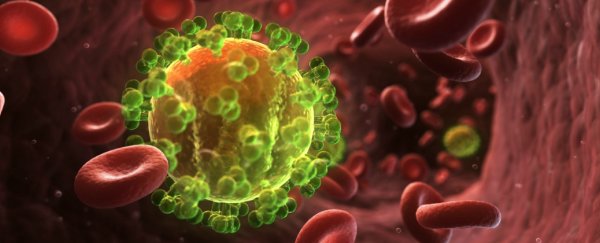A French teenager who was born with HIV has shown no signs of infection for the past 12 years, despite taking no medication during that period. This is the longest time on record that a young person with HIV has been in remission, and researchers are trying to figure out what it was about the patient's immune system or early treatments that has kept her so healthy.
The unidentified female patient was treated with antiretroviral medication until around six weeks of age. At three months old, doctors started to give her a cocktail of four HIV drugs to keep the infection under control long-term. But when her parents stopped giving her the treatments for unknown reasons when she was six, the virus didn't resurface as expected. A year later, blood tests couldn't detect the HIV, so doctors decided to keep her off the medication. She's now 18, and the infection is still under control, researchers announced on Monday at the 2015 International Aids Society Conference in Canada.
The case is the most promising indication so far that we might be able to keep HIV under control for long periods of time in children, without the side effects and expense of regular medication - something that has so far only been achieved with adults.
But Asier Sáez-Cirión, a researcher from the Pasteur Institute in Paris who worked on teenager's case, was quick to tell Lenny Bernstein over at The Washington Post that there's still a lot of unknowns about how exactly the girl has controlled the virus for so long. "This girl is in remission," he said. "She's not cured."
This French patient joins a very small group of patients around the world who have been able to keep their HIV under control after coming off medication, including 14 French adults and the 'Mississippi baby', who was announced as "functionally cured" back in 2013. Shortly before her fourth birthday, she tested positive for HIV again, but before that she'd managed to keep the virus under control for almost three years, having been given an aggressive cocktail of antiretroviral therapy within hours of birth.
The one thing all these 'post-treatment controllers' have in common is the fact that they were treated early. "This case is clearly additional evidence of the powerful benefit of starting treatment as soon as possible," Nobel Prize-winning HIV researcher Francoise Barre-Sinoussi told Nature.
Right now it's not clear whether the results could be replicable in other patients. Although there's nothing obviously unique about the immunology of the 'post-treatment controllers', there's a chance that they could be naturally better equipped to keep HIV at bay - just like the 1 percent of HIV patients that can control the virus without ever starting treatment.
This is something that Steve Deeks, professor of medicine at the University of California, San Francisco, is hoping to figure out next year, when he begins a new clinical trial of more than 100 HIV patients.
Deeks told Simeon Bennett at Bloomberg Business that he plans to treat people with aggressive antiretrovirals shortly after infection, and then interrupt the regime - just like in the case of the French teenager - and see whether the virus returns.
"What the field needs to do next to confirm this is real is to interrupt therapy in a controlled manner in a large number of individuals and see what happens," Deeks said. His proposed trial will monitor patients closely after their treatment ends, and put them back on medication at the first sign of the virus rebounding. The earliest results are expected by 2018.
In the meantime, Sáez-Cirión told The Washington Post there's no way to predict how long the French teen will stay in remission, and as she ages her chances of the HIV remerging "are going to be higher". But her case will hopefully help researchers figure out why some HIV patients are able to live healthily for years without medication, and potentially even how we can replicate this in others.
